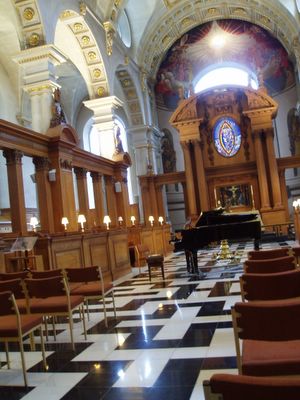This will become an annual event in London for me: listen live to The Rite of Spring at the Prom (see 7 September 2005).
This year Stravinsky's masterpiece (in my opinion) is performed by Budapest Festival Orchestra with Ivan Fischer as conductor. Honestly I wondered if they could live up to my expectation from this piece of music. But I worried too much. I only need to repeat what I wrote last year:
Stravinsky is a genious composer. The contrast of quietness and loudness, one instrument after another claiming its presence in waves, and very progressive patterns of rhythms continuously coming in an unexpected way.
I've come to think that I probably shouldn't listen to The Rite of Spring (see
notes at the Prom website) unless I'm in front of the orchestra, which allows me to enjoy the music in a three-dimensional way. That is probably the best way of appreciating "Stravinsky's immortal hymn to spring". (Still,
you can listen to the performance online. Skip the first 5 minutes. The BBC Radio online production teams are so lazy that different programmes are often attached in the first few minutes.)
The composition is often introduced as a piece of classical music that teenagers who like pop music can appreciate. I doubt it. It's totally different from pop music. There's no clear-cut melody, and it's the rhythm that is at the centre stage throughout the tune - very different from pop songs. And the rhythm is extremely irregular - very different from house music. And a lot of contrast in the sound volume - very different from maintream rock music. Unless you like progressive rock or perhaps drum & bass, or unless you simply like "sound", you probably won't find it interesting.
Incidentally, I liked the second movement of
Bartok's piano concerto no.3, performed by pianist Garrick Ohlsson with the orchestra before The Rite of Spring on the night. It's probably unusual to like the second movement - which is often the most boring part of the whole composition. But this one, a very subtle "alternation of the piano's hymn and the strings' answering phrases", sneaked deep into my mind. Again, it wouldn't have been like that if I had listened to it on the radio etc.
Tips for enjoying BBC Proms right in front of the orchestra by paying 5 pounds on the day:
1. Make sure you have 5 quid in cash - they don't accept cards for day Arena tickets.
2. The entrance is Door 11. There may be a queue from the Door. Do not confuse it with Door 10, which is the entrance for the Gallery (high up in the Royal Albert Hall), or the Box Office which only sells seat tickets.
3. Once you enter, find Arena A or Arena F entrance. That takes you to right in front of the stage. Even if you come rather late, there is some space to stand within 10 meters from the stage. If you enter through Arena B to E entrances, you will find it difficult to get to the front as people are sitting down on the floor all over the Arena.
POSTSCRIPT on 20th August 2006: I found
a review article by Tom Service appearing in
The Guardian, 18th August 2006. It seems I was very lucky: Tom Service found that Ivan Fischer and the Budapest Festival Orchestra "revealed new dimensions" of Stravinsky's Rite of Spring.
